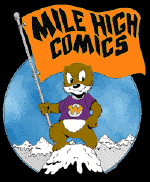The International Association of
Direct Distributors
|
In my past couple of columns, I have tried to show how the differentials in freight rebate payments, and efficiencies of scale in shipping, combined to give the larger distributors servicing comics stores during the early 1980's huge competitive advantages over their smaller brethren. Ultimately it was those small incremental edges in profitability, such as freight cost differentials, that eventually led us to our current situation of having just one distributor providing comics to every single comics shop in existence. Before we ended up in this unenviable position, however, there were several interesting twists in the historical path. I'll start my recounting of that less than stellar series of events by providing you a brief history of IADD, The International Association of Direct Distributors. IADD was formed at the San Diego Comics Convention in the summer of 1981. What prompted the very first semi-official group meeting among the distributors attending the convention was a deep concern over the lack of new trade terms from DC Comics. While Marvel had completely opened up their distribution of comics to anyone who could clear a $3,000 monthly check in July of 1979, DC stalled and stalled at providing a clear set of new trade terms. There were distributors who were already buying directly from DC (such as Phil Seuling's Seagate Distributing), but those contracts were very tenuous. DC had made clear that they were planning new trade terms, but absolutely refused to reveal the hurdles that would be placed before any prospective distributor. It was during our informal personal discussions at San Diego that it was mutually agreed among the Direct Market distributors in attendence that we needed to have some sort of an umbrella organization that would allow us to discuss DC's new trade terms as a group. Since I was on very friendly terms with the management of the Westgate Hotel Dining Room (the very fancy hotel right across the street from the old downtown San Diego convention center), I arranged for the meeting space for that seminal gathering of IADD. The Westgate Dining Room was divided into two parts, with a seating area for twenty in the rear, separated from the main dining room. It was in this semi-private enclosed space that about a dozen distributor representatives gathered on Sunday morning to see if we could set aside our mutual differences long enough to create an entity that might provide us a unified front in our discussions with DC. I have to tell you that that first IADD meeting darn near turned into a brawl. Several of the distributors had been engaged in bitter turf wars over customers, and did not like each other even in the slightest. This mutual antipathy led to several vehement shouting matches, which to my great embarrassment, could be clearly heard by the patrons of the main dining room. The shouting finally escalated to the the point where two particularly belligerent distributors had to be restrained. As crazy as it may seem today, these two guys were so passionate in their dislike of each other that they wanted to go out on to the sidewalk in front of the hotel and pound each other bloody. Actually, the reality was that none of us liked them much either, so I think that under different circumstances that all of us would have gladly have let those two obnoxious jerks do to each other that which we all (in our deepest private dreams) wished we could do to both of them. The price of politics, however is that you frequently have to sit down and work out arrangements even with those whom you loath. So we calmed those two idiots down enough to where the manager of the hotel agreed to not ask us to leave, and ultimately worked out a simple framework for our new organization. To me, the most interesting part of the formation of IADD was the input provided by Phil Seuling. Seuling, as you may recall, originally conceptionalized the idea of buying comics "Directly" from the publishers, and distributing them "Directly" to comics shops (thus bypassing the entire newsstand distribution system). From the time he set up Seagate Distributing in 1973, until Marvel opened up their trade terms in 1979, he controlled the vast majority of new comics distribution into comics shops. While the opening of Marvel's trade terms acted to turn a dozen of his largest sub-distributors into competitors, Seuling still controlled substantial market share in 1981. Ironically, my memory is that Phil was one of the strongest proponents of our gathering for that first IADD meeting. Phil could hold a grudge about as well as anyone I've ever known, but he was also remarkably pragmatic. He stated to all of us quite unequivocally during that first meeting that the publishers were our enemies, and that they would plot endlessly to screw us without mercy. Many of us rolled our eyes as Phil ranted on and on about how it was only his dominance of the distribution system prior to 1980 that had held the evil plans of the comics publishers in check. Given that Marvel's opening of their distribution had just cost Phil a huge percentage of his gross sales, we all thought at the time that he was merely projecting his own anger into a very broad generality of hating the publishers. Phil did make us all stop to think, however, about the potential implications of a combined threat to all our companies. Ultimately, it was Phil Seuling's chilling predictions that provided the binding element of fear that forced us all to agree to work together. To be continued...
Please send your e-mails to chuck@milehighcomics.com, and your letters to:
Mile High Comics, Inc.
|
| Previous | Next |

